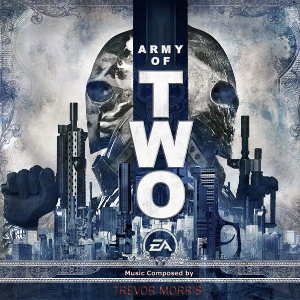Army of Two Original Videogame Score
 |
Album Title: Army of Two Original Videogame Score |
| Record Label: Electronic Arts |
|
| Catalog No.: N/A |
|
| Release Date: December 18, 2007 |
|
| Purchase: Download at iTunes |
Overview
EA Montreal’s Army of Two depicts the missions of Salem and Rios, two highly trained and armed to the teeth mercenaries, with its unique cooperative gameplay. The music for this modern war shooter was written by Trevor Morris, a veteran of Hans Zimmer’s Remote Control Productions who has previously worked with Electronic Arts on the Need For Speed and Command & Conquer franchises. The artist did an impressive job of blending characteristic elements of modern war scores with some more personal approaches.
Body
The soundtrack begins with “Lock and Load”, which sets the mood for the game excellently with its unique stylings. The track is driven throughout by some aggressive electronic riffs and adrenaline-pumping percussion that capture a sense of modern warfare. The contrasts of patriotic strings and ethnic wails in the treble reflect how the characters have become mercenaries. Their story generally takes a backseat to the action throughout this soundtrack, though there are some soundtracks that encourage empathy with the characters. Patriotic themes, such as “US Army Rangers”, feature particularly sad melodies and evocative soundscapes that build upon the tradition of classic war scores.
There are many action tracks on this war shooter that build on the benchmark of the opener. The fierce firefights are best highlighted with tracks “Gun Battles” and “Take Em’ Down”, which aggressively fuse militaristic orchestration with cutting-edge electronics using Remote Control Productions’ state-of-the-art equipment. Unlike older war scores, there are no beautiful brass melodies here in favour of persistent beats and ferocious interjections. “Miami”, on the other hand, the mercenaries back to Western shores with a high-octane orchestration and continually building motifs. The timbral and rhythmical features of this track are a perfect complement to the scenario.
The other action tracks on the soundtrack all feature raw mechanised soundscapes, though all carry distinction from one another. “Somalia Imminent” and “Escape”, for instance, gradually intensify in rhythm and volume to build up anticipation and suspense during the game’s impressive sequences. “Enemy Territory” and “Desert Winds”, on the other hand, represent the hostility of the environments and enemies of the Middle East. Though these tracks feature distinctive tonalities, Morris could have emphasised the distinction of the environment through using more regional instruments here. Perhaps the artist wanted to avoid these mainstay of Remote Control scores in favour of a more individual sound.
While the soundtrack focuses on fast-paced and intense music, there are some contrasting tracks used during specific sequences. “Iraq”, for instance, an excellent example of the slower slow and quiet tracks which are focused on creating a clear yet unexplainable ominous mood. It still gives a warning of danger in forms of high pitched strings and brass interjections, in a manner comparable to the Metal Gear Solid series. “Don’t Breath” is a horror track that has an incredible effect in context with its shrieking instruments, whereas “The Unknown” is relatively clichéd with its tremolo strings focus. While tracks such as these form a solid accompaniment to the scenario, a number of tracks on this rather extensive release are too sparse or short to be worth stand-alone listening.
Summary
Raw, intense, and unrelenting, Morris’ score for Army of Two is a realistic depiction of modern cooperative warfare. The music works flawlessly with the various cinematic and gameplay sequences of the game, to reflect mechanised mercenaries within a range of environments. Not all the tracks are as enjoyable on a stand-alone level, due to their raw hostile quality, though thrill-seekers who enjoy the likes of Tyler Bates and Paul Haslinger should enjoy this. Despite its handful of throwaway tracks, this extensive digital release is cautiously recommended.
Do you agree with the review and score? Let us know in the comments below!
3.5
Posted on August 1, 2012 by Harris Iqbal. Last modified on January 22, 2016.














